Deakin University, HNN301: Bullying and Shift Work in Nursing
VerifiedAdded on 2022/10/11
|10
|2350
|12
Essay
AI Summary
This essay examines the detrimental effects of workplace bullying and shift work on nurses' mental health, as well as the strategy to build resilience in nurses. The essay highlights the prevalence of bullying in nursing, detailing its negative consequences such as stress, anxiety, and depression. It also discusses the health issues associated with shift work, including disruption of circadian rhythms and sleep deprivation. The essay then proposes resilience-building programs, including emotional management training, communication skills development, stress management techniques, and the importance of a healthy lifestyle to mitigate these issues and improve nurses' wellbeing. The essay concludes by emphasizing the need for proactive measures to create a supportive and healthy work environment for nurses.
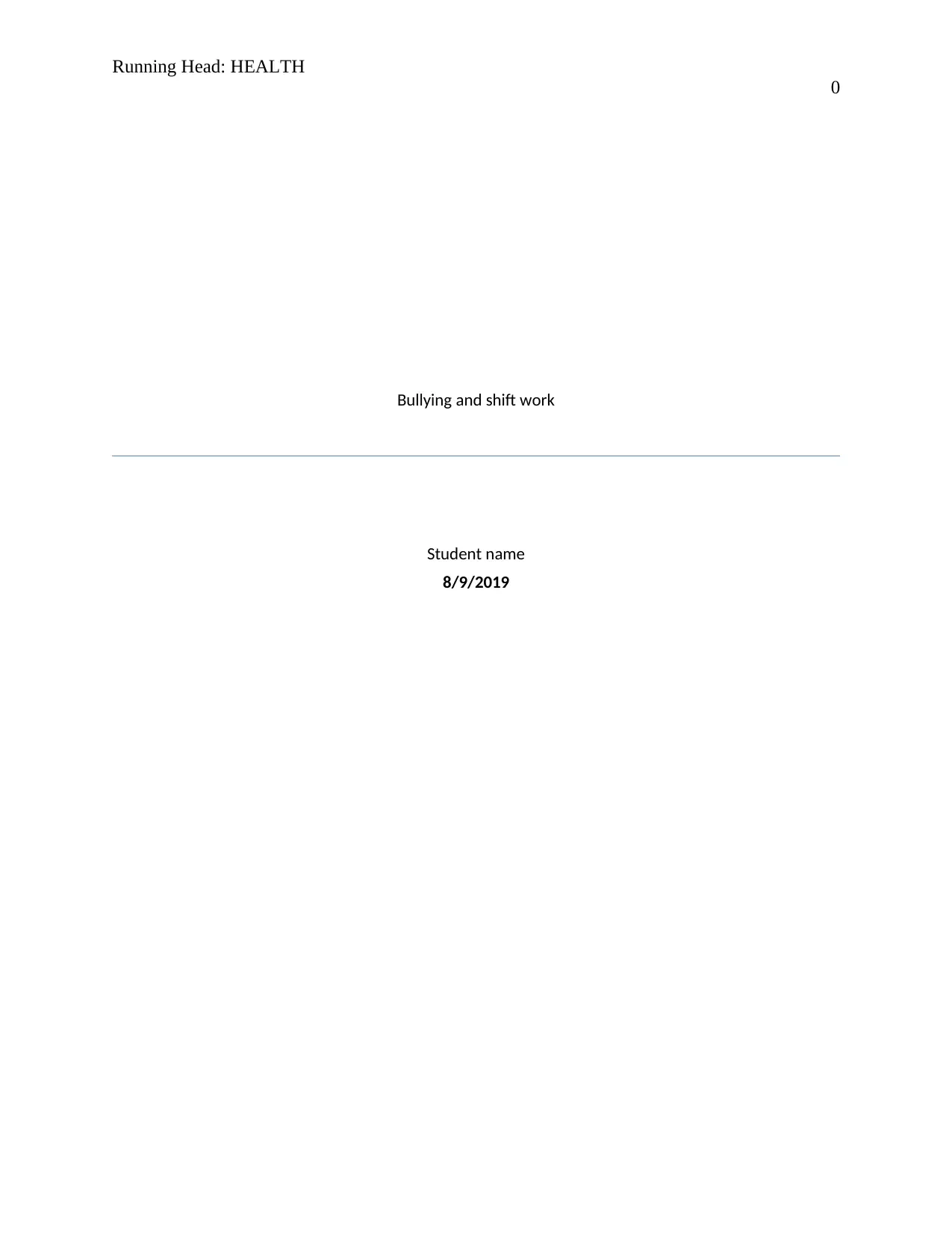
Running Head: HEALTH
0
Bullying and shift work
Student name
8/9/2019
0
Bullying and shift work
Student name
8/9/2019
Paraphrase This Document
Need a fresh take? Get an instant paraphrase of this document with our AI Paraphraser
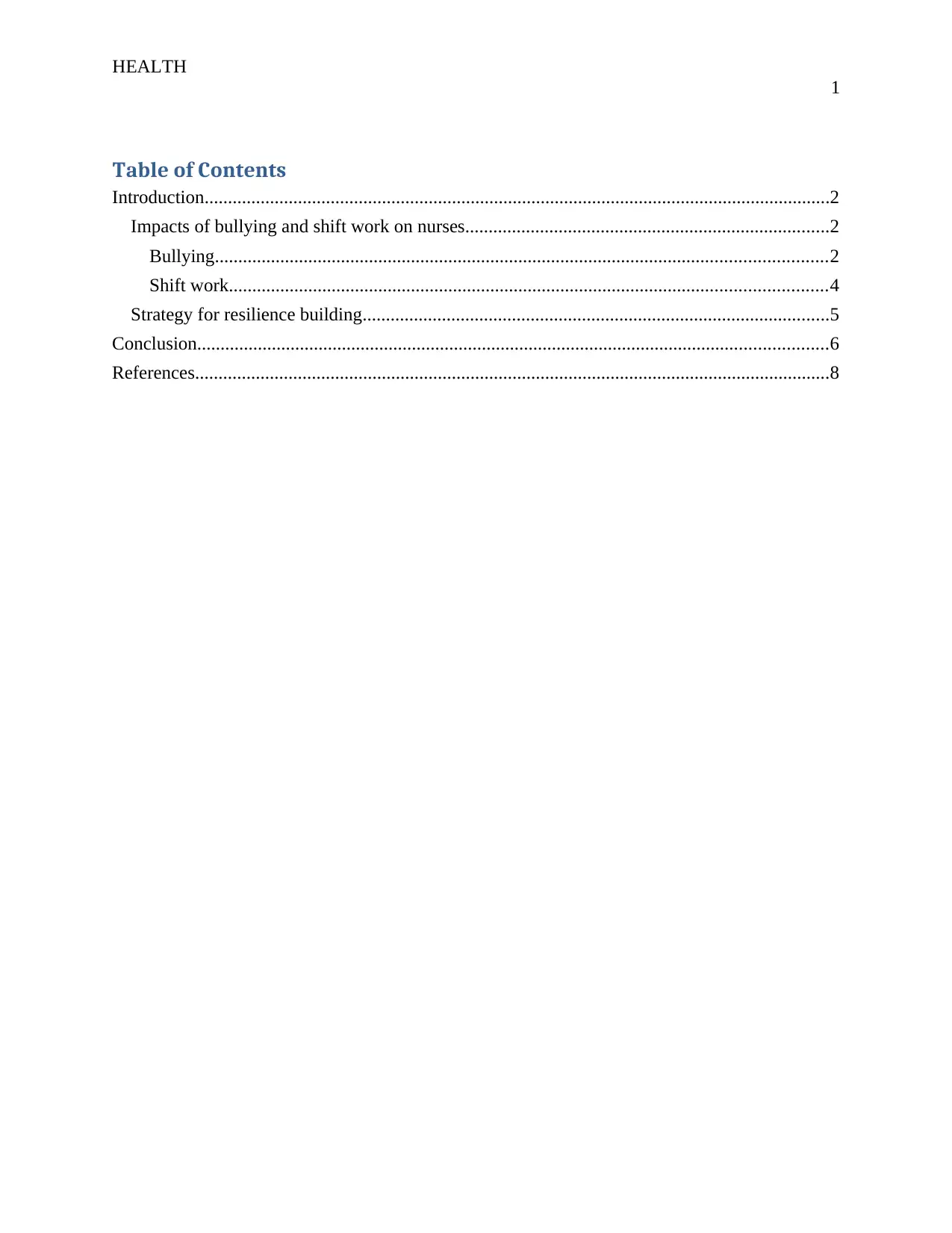
HEALTH
1
Table of Contents
Introduction......................................................................................................................................2
Impacts of bullying and shift work on nurses..............................................................................2
Bullying...................................................................................................................................2
Shift work................................................................................................................................4
Strategy for resilience building....................................................................................................5
Conclusion.......................................................................................................................................6
References........................................................................................................................................8
1
Table of Contents
Introduction......................................................................................................................................2
Impacts of bullying and shift work on nurses..............................................................................2
Bullying...................................................................................................................................2
Shift work................................................................................................................................4
Strategy for resilience building....................................................................................................5
Conclusion.......................................................................................................................................6
References........................................................................................................................................8
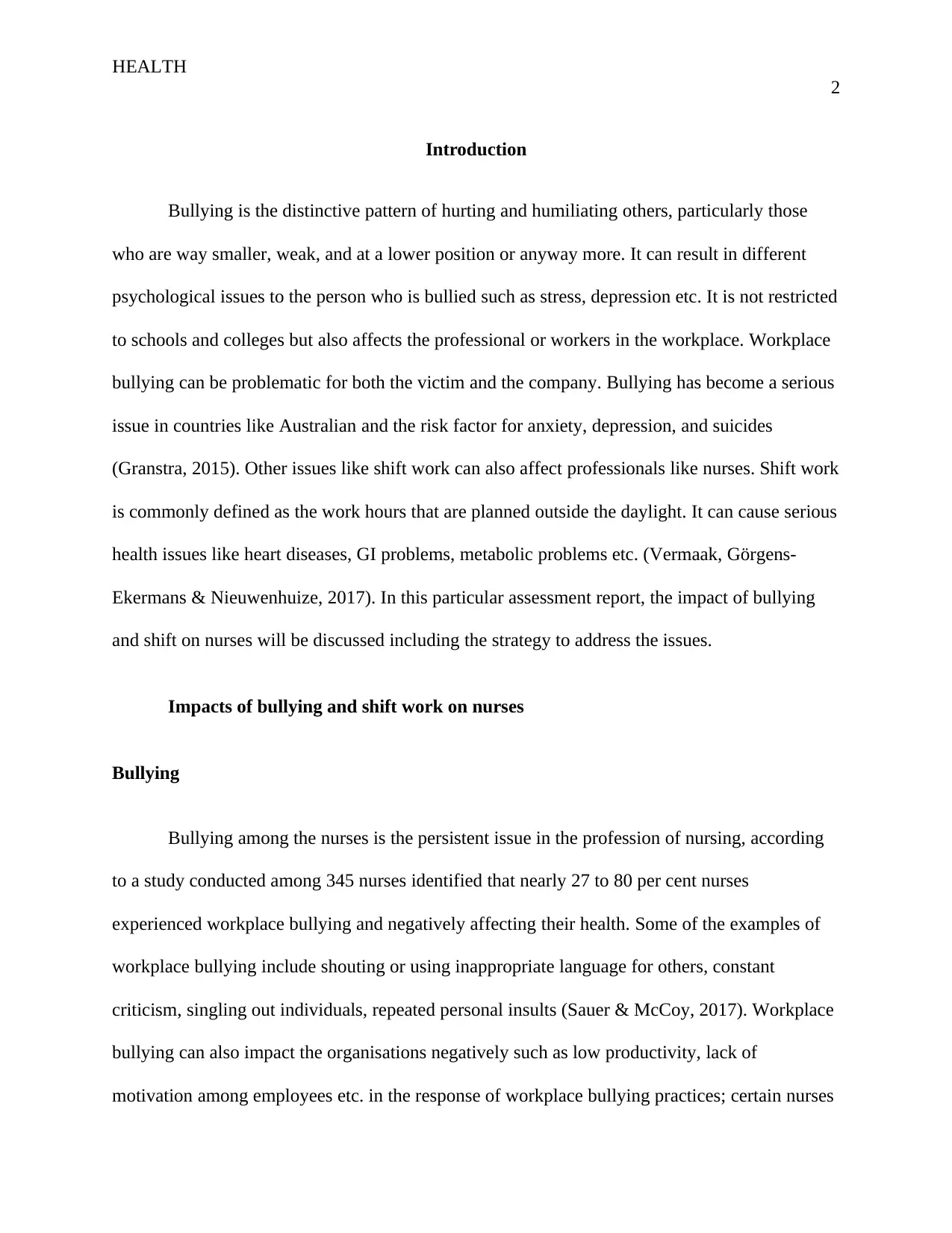
HEALTH
2
Introduction
Bullying is the distinctive pattern of hurting and humiliating others, particularly those
who are way smaller, weak, and at a lower position or anyway more. It can result in different
psychological issues to the person who is bullied such as stress, depression etc. It is not restricted
to schools and colleges but also affects the professional or workers in the workplace. Workplace
bullying can be problematic for both the victim and the company. Bullying has become a serious
issue in countries like Australian and the risk factor for anxiety, depression, and suicides
(Granstra, 2015). Other issues like shift work can also affect professionals like nurses. Shift work
is commonly defined as the work hours that are planned outside the daylight. It can cause serious
health issues like heart diseases, GI problems, metabolic problems etc. (Vermaak, Görgens-
Ekermans & Nieuwenhuize, 2017). In this particular assessment report, the impact of bullying
and shift on nurses will be discussed including the strategy to address the issues.
Impacts of bullying and shift work on nurses
Bullying
Bullying among the nurses is the persistent issue in the profession of nursing, according
to a study conducted among 345 nurses identified that nearly 27 to 80 per cent nurses
experienced workplace bullying and negatively affecting their health. Some of the examples of
workplace bullying include shouting or using inappropriate language for others, constant
criticism, singling out individuals, repeated personal insults (Sauer & McCoy, 2017). Workplace
bullying can also impact the organisations negatively such as low productivity, lack of
motivation among employees etc. in the response of workplace bullying practices; certain nurses
2
Introduction
Bullying is the distinctive pattern of hurting and humiliating others, particularly those
who are way smaller, weak, and at a lower position or anyway more. It can result in different
psychological issues to the person who is bullied such as stress, depression etc. It is not restricted
to schools and colleges but also affects the professional or workers in the workplace. Workplace
bullying can be problematic for both the victim and the company. Bullying has become a serious
issue in countries like Australian and the risk factor for anxiety, depression, and suicides
(Granstra, 2015). Other issues like shift work can also affect professionals like nurses. Shift work
is commonly defined as the work hours that are planned outside the daylight. It can cause serious
health issues like heart diseases, GI problems, metabolic problems etc. (Vermaak, Görgens-
Ekermans & Nieuwenhuize, 2017). In this particular assessment report, the impact of bullying
and shift on nurses will be discussed including the strategy to address the issues.
Impacts of bullying and shift work on nurses
Bullying
Bullying among the nurses is the persistent issue in the profession of nursing, according
to a study conducted among 345 nurses identified that nearly 27 to 80 per cent nurses
experienced workplace bullying and negatively affecting their health. Some of the examples of
workplace bullying include shouting or using inappropriate language for others, constant
criticism, singling out individuals, repeated personal insults (Sauer & McCoy, 2017). Workplace
bullying can also impact the organisations negatively such as low productivity, lack of
motivation among employees etc. in the response of workplace bullying practices; certain nurses
⊘ This is a preview!⊘
Do you want full access?
Subscribe today to unlock all pages.

Trusted by 1+ million students worldwide
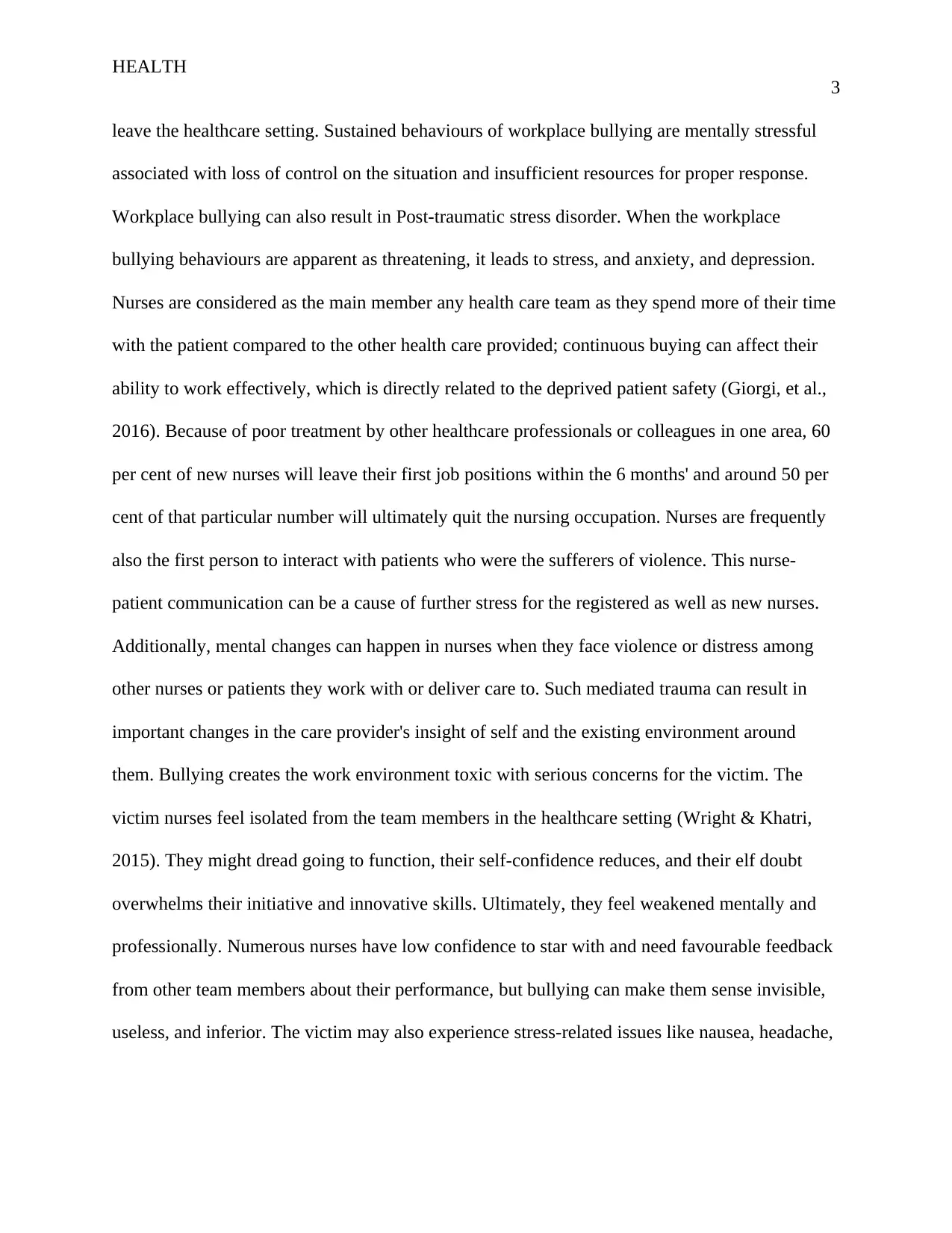
HEALTH
3
leave the healthcare setting. Sustained behaviours of workplace bullying are mentally stressful
associated with loss of control on the situation and insufficient resources for proper response.
Workplace bullying can also result in Post-traumatic stress disorder. When the workplace
bullying behaviours are apparent as threatening, it leads to stress, and anxiety, and depression.
Nurses are considered as the main member any health care team as they spend more of their time
with the patient compared to the other health care provided; continuous buying can affect their
ability to work effectively, which is directly related to the deprived patient safety (Giorgi, et al.,
2016). Because of poor treatment by other healthcare professionals or colleagues in one area, 60
per cent of new nurses will leave their first job positions within the 6 months' and around 50 per
cent of that particular number will ultimately quit the nursing occupation. Nurses are frequently
also the first person to interact with patients who were the sufferers of violence. This nurse-
patient communication can be a cause of further stress for the registered as well as new nurses.
Additionally, mental changes can happen in nurses when they face violence or distress among
other nurses or patients they work with or deliver care to. Such mediated trauma can result in
important changes in the care provider's insight of self and the existing environment around
them. Bullying creates the work environment toxic with serious concerns for the victim. The
victim nurses feel isolated from the team members in the healthcare setting (Wright & Khatri,
2015). They might dread going to function, their self-confidence reduces, and their elf doubt
overwhelms their initiative and innovative skills. Ultimately, they feel weakened mentally and
professionally. Numerous nurses have low confidence to star with and need favourable feedback
from other team members about their performance, but bullying can make them sense invisible,
useless, and inferior. The victim may also experience stress-related issues like nausea, headache,
3
leave the healthcare setting. Sustained behaviours of workplace bullying are mentally stressful
associated with loss of control on the situation and insufficient resources for proper response.
Workplace bullying can also result in Post-traumatic stress disorder. When the workplace
bullying behaviours are apparent as threatening, it leads to stress, and anxiety, and depression.
Nurses are considered as the main member any health care team as they spend more of their time
with the patient compared to the other health care provided; continuous buying can affect their
ability to work effectively, which is directly related to the deprived patient safety (Giorgi, et al.,
2016). Because of poor treatment by other healthcare professionals or colleagues in one area, 60
per cent of new nurses will leave their first job positions within the 6 months' and around 50 per
cent of that particular number will ultimately quit the nursing occupation. Nurses are frequently
also the first person to interact with patients who were the sufferers of violence. This nurse-
patient communication can be a cause of further stress for the registered as well as new nurses.
Additionally, mental changes can happen in nurses when they face violence or distress among
other nurses or patients they work with or deliver care to. Such mediated trauma can result in
important changes in the care provider's insight of self and the existing environment around
them. Bullying creates the work environment toxic with serious concerns for the victim. The
victim nurses feel isolated from the team members in the healthcare setting (Wright & Khatri,
2015). They might dread going to function, their self-confidence reduces, and their elf doubt
overwhelms their initiative and innovative skills. Ultimately, they feel weakened mentally and
professionally. Numerous nurses have low confidence to star with and need favourable feedback
from other team members about their performance, but bullying can make them sense invisible,
useless, and inferior. The victim may also experience stress-related issues like nausea, headache,
Paraphrase This Document
Need a fresh take? Get an instant paraphrase of this document with our AI Paraphraser
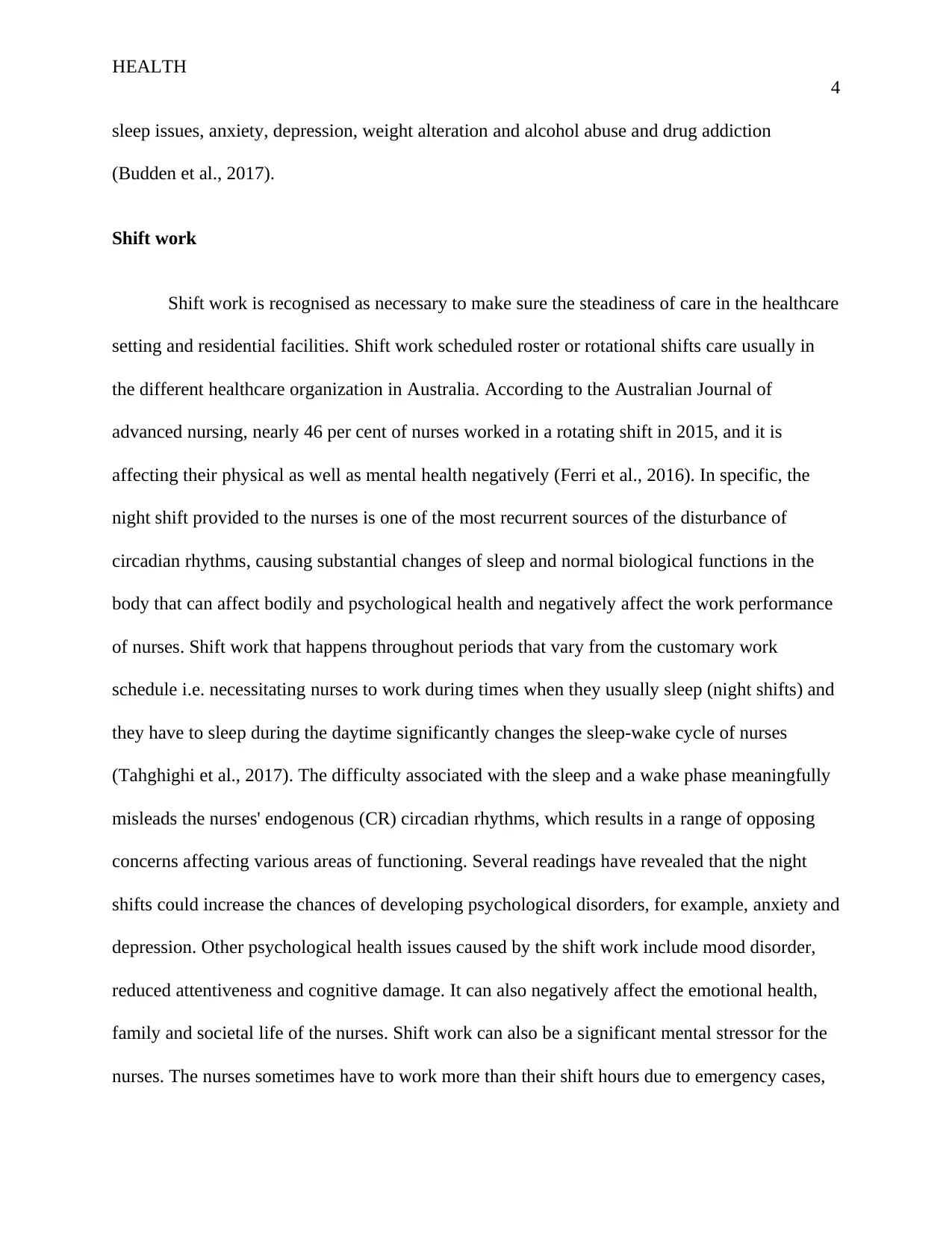
HEALTH
4
sleep issues, anxiety, depression, weight alteration and alcohol abuse and drug addiction
(Budden et al., 2017).
Shift work
Shift work is recognised as necessary to make sure the steadiness of care in the healthcare
setting and residential facilities. Shift work scheduled roster or rotational shifts care usually in
the different healthcare organization in Australia. According to the Australian Journal of
advanced nursing, nearly 46 per cent of nurses worked in a rotating shift in 2015, and it is
affecting their physical as well as mental health negatively (Ferri et al., 2016). In specific, the
night shift provided to the nurses is one of the most recurrent sources of the disturbance of
circadian rhythms, causing substantial changes of sleep and normal biological functions in the
body that can affect bodily and psychological health and negatively affect the work performance
of nurses. Shift work that happens throughout periods that vary from the customary work
schedule i.e. necessitating nurses to work during times when they usually sleep (night shifts) and
they have to sleep during the daytime significantly changes the sleep-wake cycle of nurses
(Tahghighi et al., 2017). The difficulty associated with the sleep and a wake phase meaningfully
misleads the nurses' endogenous (CR) circadian rhythms, which results in a range of opposing
concerns affecting various areas of functioning. Several readings have revealed that the night
shifts could increase the chances of developing psychological disorders, for example, anxiety and
depression. Other psychological health issues caused by the shift work include mood disorder,
reduced attentiveness and cognitive damage. It can also negatively affect the emotional health,
family and societal life of the nurses. Shift work can also be a significant mental stressor for the
nurses. The nurses sometimes have to work more than their shift hours due to emergency cases,
4
sleep issues, anxiety, depression, weight alteration and alcohol abuse and drug addiction
(Budden et al., 2017).
Shift work
Shift work is recognised as necessary to make sure the steadiness of care in the healthcare
setting and residential facilities. Shift work scheduled roster or rotational shifts care usually in
the different healthcare organization in Australia. According to the Australian Journal of
advanced nursing, nearly 46 per cent of nurses worked in a rotating shift in 2015, and it is
affecting their physical as well as mental health negatively (Ferri et al., 2016). In specific, the
night shift provided to the nurses is one of the most recurrent sources of the disturbance of
circadian rhythms, causing substantial changes of sleep and normal biological functions in the
body that can affect bodily and psychological health and negatively affect the work performance
of nurses. Shift work that happens throughout periods that vary from the customary work
schedule i.e. necessitating nurses to work during times when they usually sleep (night shifts) and
they have to sleep during the daytime significantly changes the sleep-wake cycle of nurses
(Tahghighi et al., 2017). The difficulty associated with the sleep and a wake phase meaningfully
misleads the nurses' endogenous (CR) circadian rhythms, which results in a range of opposing
concerns affecting various areas of functioning. Several readings have revealed that the night
shifts could increase the chances of developing psychological disorders, for example, anxiety and
depression. Other psychological health issues caused by the shift work include mood disorder,
reduced attentiveness and cognitive damage. It can also negatively affect the emotional health,
family and societal life of the nurses. Shift work can also be a significant mental stressor for the
nurses. The nurses sometimes have to work more than their shift hours due to emergency cases,
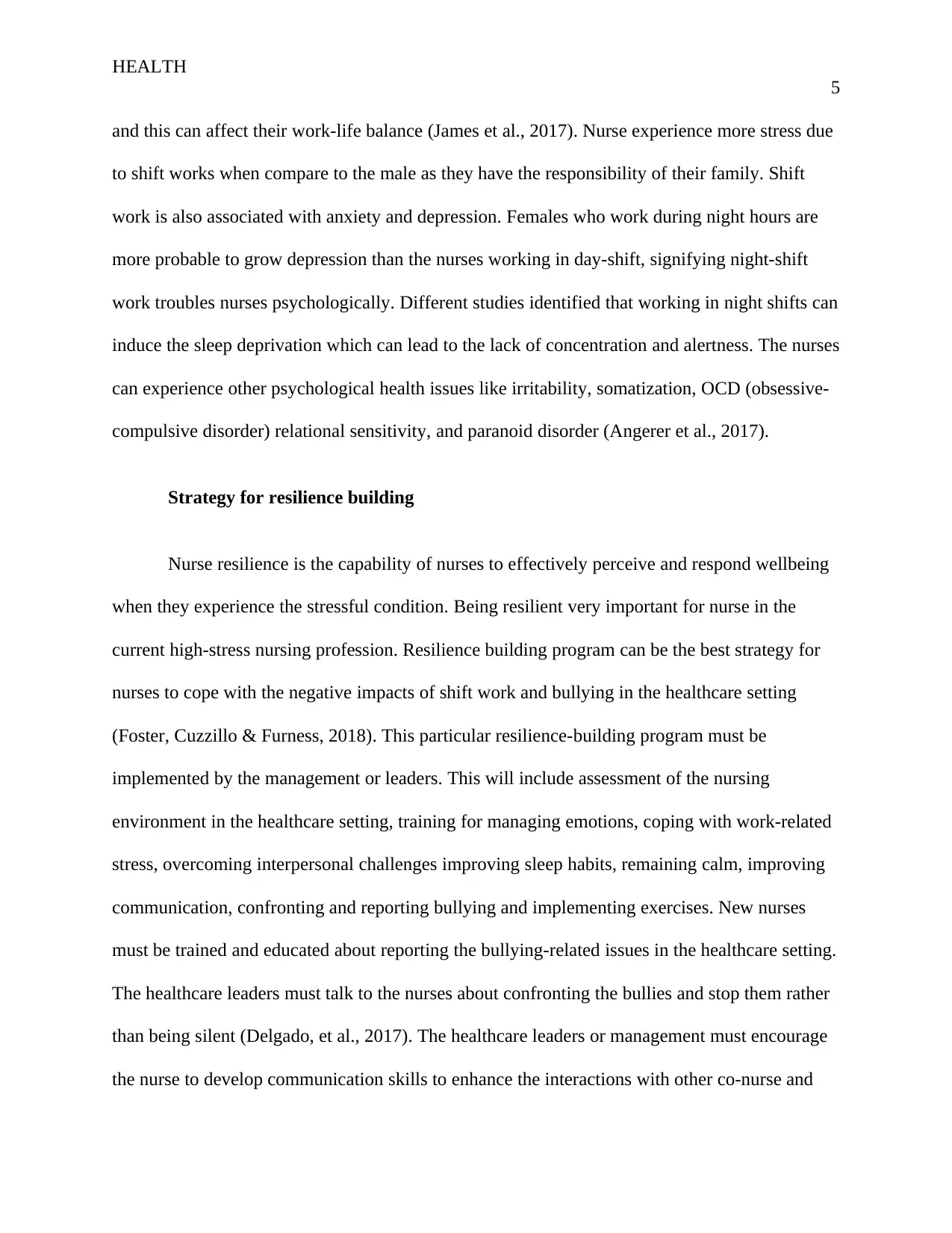
HEALTH
5
and this can affect their work-life balance (James et al., 2017). Nurse experience more stress due
to shift works when compare to the male as they have the responsibility of their family. Shift
work is also associated with anxiety and depression. Females who work during night hours are
more probable to grow depression than the nurses working in day-shift, signifying night-shift
work troubles nurses psychologically. Different studies identified that working in night shifts can
induce the sleep deprivation which can lead to the lack of concentration and alertness. The nurses
can experience other psychological health issues like irritability, somatization, OCD (obsessive-
compulsive disorder) relational sensitivity, and paranoid disorder (Angerer et al., 2017).
Strategy for resilience building
Nurse resilience is the capability of nurses to effectively perceive and respond wellbeing
when they experience the stressful condition. Being resilient very important for nurse in the
current high-stress nursing profession. Resilience building program can be the best strategy for
nurses to cope with the negative impacts of shift work and bullying in the healthcare setting
(Foster, Cuzzillo & Furness, 2018). This particular resilience-building program must be
implemented by the management or leaders. This will include assessment of the nursing
environment in the healthcare setting, training for managing emotions, coping with work-related
stress, overcoming interpersonal challenges improving sleep habits, remaining calm, improving
communication, confronting and reporting bullying and implementing exercises. New nurses
must be trained and educated about reporting the bullying-related issues in the healthcare setting.
The healthcare leaders must talk to the nurses about confronting the bullies and stop them rather
than being silent (Delgado, et al., 2017). The healthcare leaders or management must encourage
the nurse to develop communication skills to enhance the interactions with other co-nurse and
5
and this can affect their work-life balance (James et al., 2017). Nurse experience more stress due
to shift works when compare to the male as they have the responsibility of their family. Shift
work is also associated with anxiety and depression. Females who work during night hours are
more probable to grow depression than the nurses working in day-shift, signifying night-shift
work troubles nurses psychologically. Different studies identified that working in night shifts can
induce the sleep deprivation which can lead to the lack of concentration and alertness. The nurses
can experience other psychological health issues like irritability, somatization, OCD (obsessive-
compulsive disorder) relational sensitivity, and paranoid disorder (Angerer et al., 2017).
Strategy for resilience building
Nurse resilience is the capability of nurses to effectively perceive and respond wellbeing
when they experience the stressful condition. Being resilient very important for nurse in the
current high-stress nursing profession. Resilience building program can be the best strategy for
nurses to cope with the negative impacts of shift work and bullying in the healthcare setting
(Foster, Cuzzillo & Furness, 2018). This particular resilience-building program must be
implemented by the management or leaders. This will include assessment of the nursing
environment in the healthcare setting, training for managing emotions, coping with work-related
stress, overcoming interpersonal challenges improving sleep habits, remaining calm, improving
communication, confronting and reporting bullying and implementing exercises. New nurses
must be trained and educated about reporting the bullying-related issues in the healthcare setting.
The healthcare leaders must talk to the nurses about confronting the bullies and stop them rather
than being silent (Delgado, et al., 2017). The healthcare leaders or management must encourage
the nurse to develop communication skills to enhance the interactions with other co-nurse and
⊘ This is a preview!⊘
Do you want full access?
Subscribe today to unlock all pages.

Trusted by 1+ million students worldwide
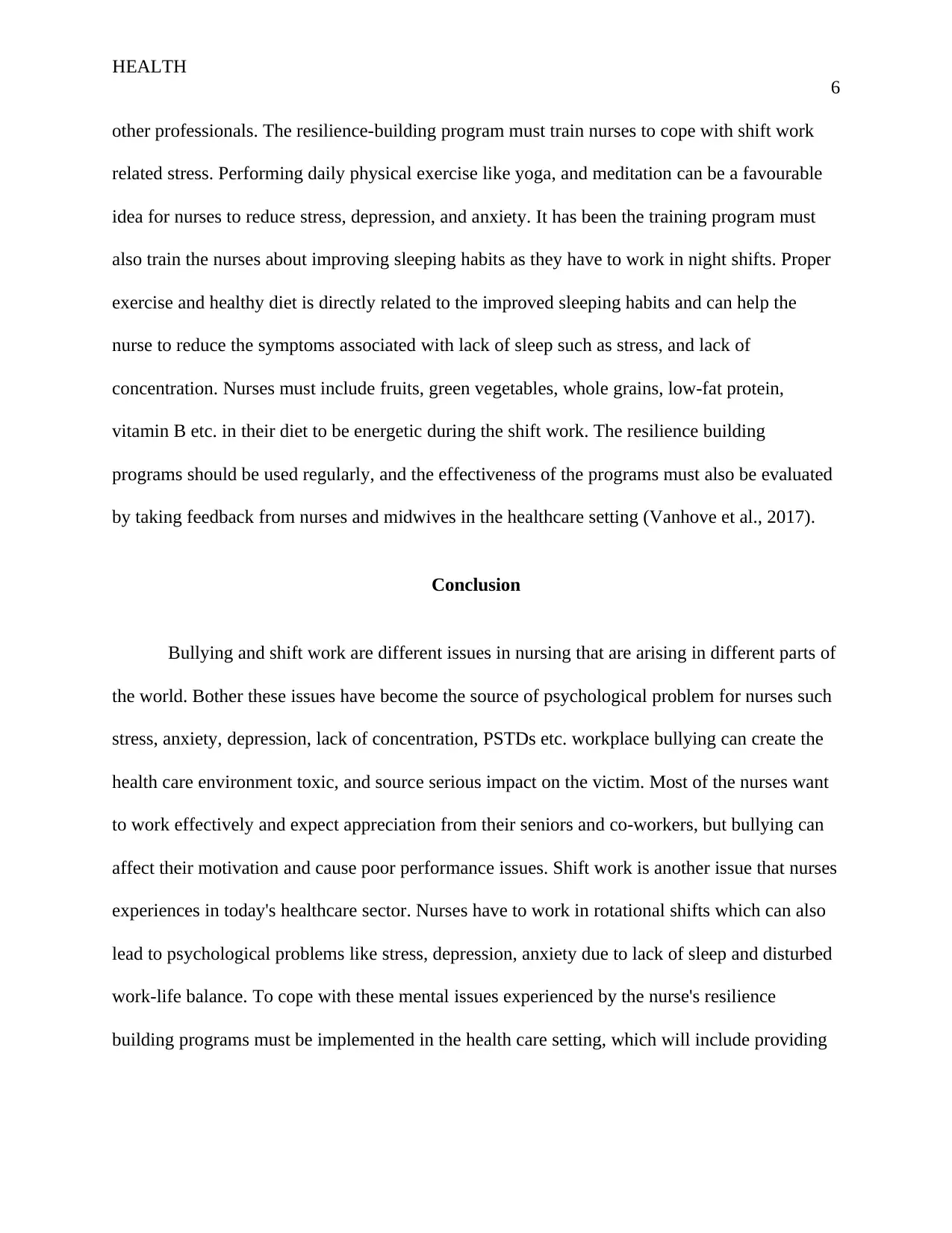
HEALTH
6
other professionals. The resilience-building program must train nurses to cope with shift work
related stress. Performing daily physical exercise like yoga, and meditation can be a favourable
idea for nurses to reduce stress, depression, and anxiety. It has been the training program must
also train the nurses about improving sleeping habits as they have to work in night shifts. Proper
exercise and healthy diet is directly related to the improved sleeping habits and can help the
nurse to reduce the symptoms associated with lack of sleep such as stress, and lack of
concentration. Nurses must include fruits, green vegetables, whole grains, low-fat protein,
vitamin B etc. in their diet to be energetic during the shift work. The resilience building
programs should be used regularly, and the effectiveness of the programs must also be evaluated
by taking feedback from nurses and midwives in the healthcare setting (Vanhove et al., 2017).
Conclusion
Bullying and shift work are different issues in nursing that are arising in different parts of
the world. Bother these issues have become the source of psychological problem for nurses such
stress, anxiety, depression, lack of concentration, PSTDs etc. workplace bullying can create the
health care environment toxic, and source serious impact on the victim. Most of the nurses want
to work effectively and expect appreciation from their seniors and co-workers, but bullying can
affect their motivation and cause poor performance issues. Shift work is another issue that nurses
experiences in today's healthcare sector. Nurses have to work in rotational shifts which can also
lead to psychological problems like stress, depression, anxiety due to lack of sleep and disturbed
work-life balance. To cope with these mental issues experienced by the nurse's resilience
building programs must be implemented in the health care setting, which will include providing
6
other professionals. The resilience-building program must train nurses to cope with shift work
related stress. Performing daily physical exercise like yoga, and meditation can be a favourable
idea for nurses to reduce stress, depression, and anxiety. It has been the training program must
also train the nurses about improving sleeping habits as they have to work in night shifts. Proper
exercise and healthy diet is directly related to the improved sleeping habits and can help the
nurse to reduce the symptoms associated with lack of sleep such as stress, and lack of
concentration. Nurses must include fruits, green vegetables, whole grains, low-fat protein,
vitamin B etc. in their diet to be energetic during the shift work. The resilience building
programs should be used regularly, and the effectiveness of the programs must also be evaluated
by taking feedback from nurses and midwives in the healthcare setting (Vanhove et al., 2017).
Conclusion
Bullying and shift work are different issues in nursing that are arising in different parts of
the world. Bother these issues have become the source of psychological problem for nurses such
stress, anxiety, depression, lack of concentration, PSTDs etc. workplace bullying can create the
health care environment toxic, and source serious impact on the victim. Most of the nurses want
to work effectively and expect appreciation from their seniors and co-workers, but bullying can
affect their motivation and cause poor performance issues. Shift work is another issue that nurses
experiences in today's healthcare sector. Nurses have to work in rotational shifts which can also
lead to psychological problems like stress, depression, anxiety due to lack of sleep and disturbed
work-life balance. To cope with these mental issues experienced by the nurse's resilience
building programs must be implemented in the health care setting, which will include providing
Paraphrase This Document
Need a fresh take? Get an instant paraphrase of this document with our AI Paraphraser
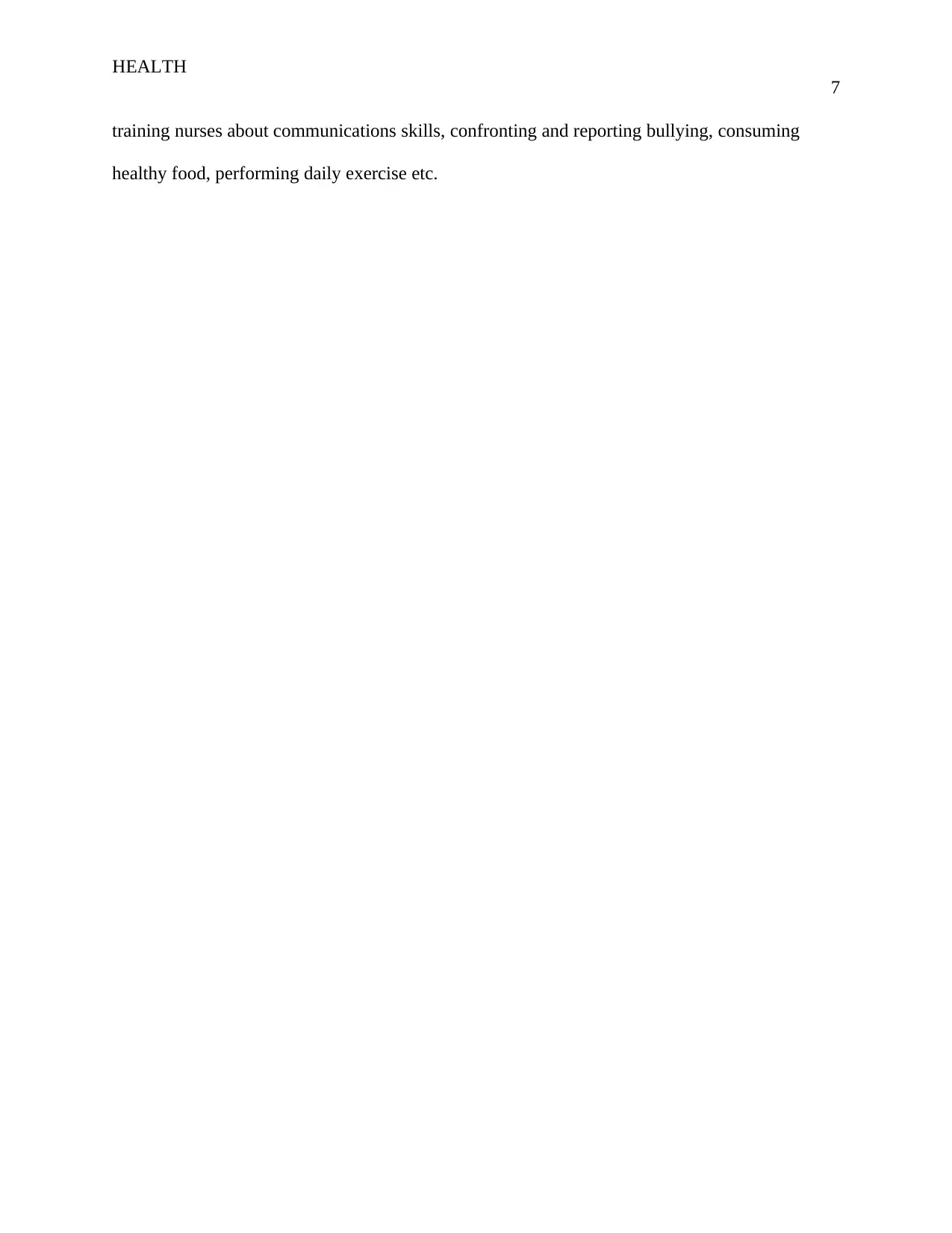
HEALTH
7
training nurses about communications skills, confronting and reporting bullying, consuming
healthy food, performing daily exercise etc.
7
training nurses about communications skills, confronting and reporting bullying, consuming
healthy food, performing daily exercise etc.
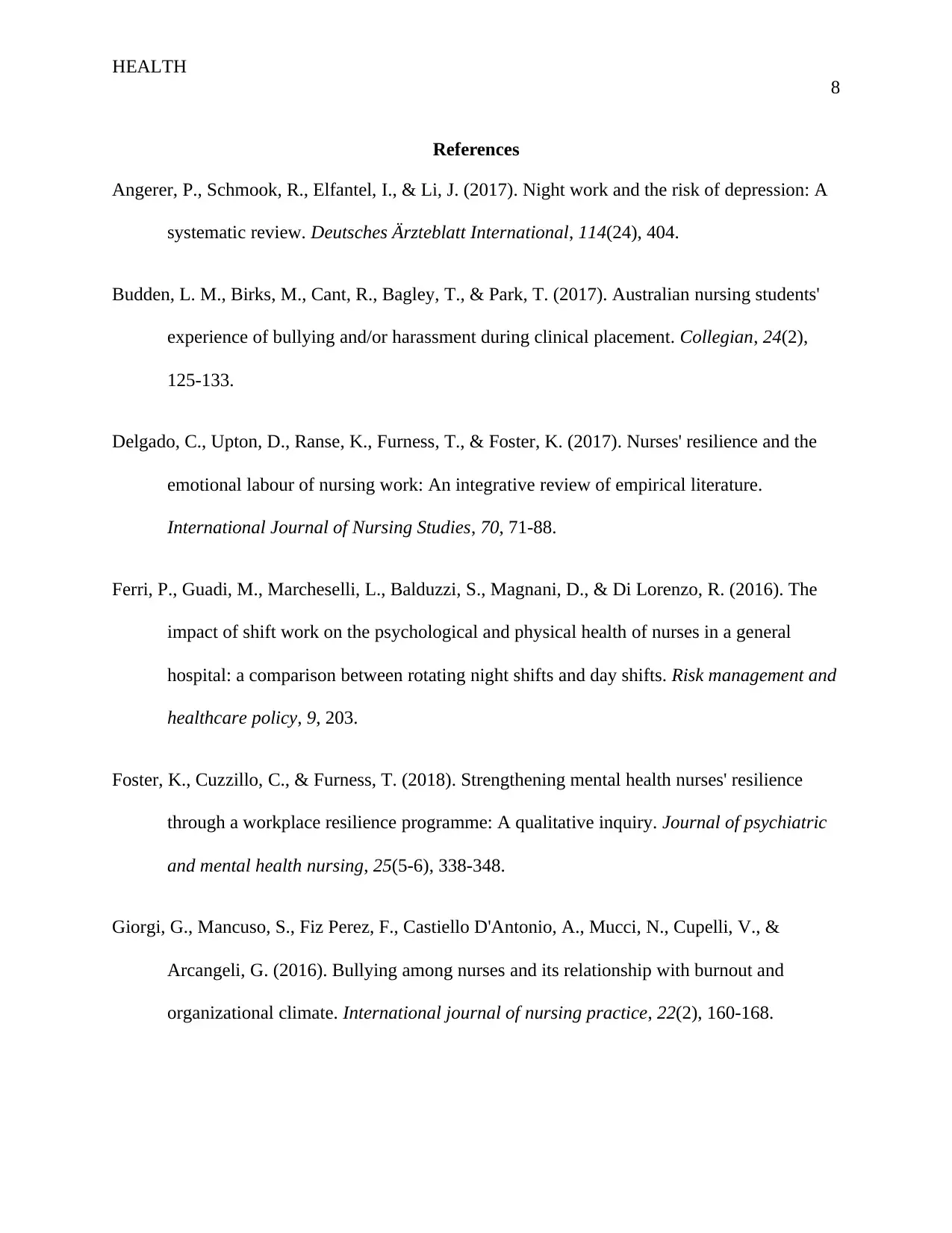
HEALTH
8
References
Angerer, P., Schmook, R., Elfantel, I., & Li, J. (2017). Night work and the risk of depression: A
systematic review. Deutsches Ärzteblatt International, 114(24), 404.
Budden, L. M., Birks, M., Cant, R., Bagley, T., & Park, T. (2017). Australian nursing students'
experience of bullying and/or harassment during clinical placement. Collegian, 24(2),
125-133.
Delgado, C., Upton, D., Ranse, K., Furness, T., & Foster, K. (2017). Nurses' resilience and the
emotional labour of nursing work: An integrative review of empirical literature.
International Journal of Nursing Studies, 70, 71-88.
Ferri, P., Guadi, M., Marcheselli, L., Balduzzi, S., Magnani, D., & Di Lorenzo, R. (2016). The
impact of shift work on the psychological and physical health of nurses in a general
hospital: a comparison between rotating night shifts and day shifts. Risk management and
healthcare policy, 9, 203.
Foster, K., Cuzzillo, C., & Furness, T. (2018). Strengthening mental health nurses' resilience
through a workplace resilience programme: A qualitative inquiry. Journal of psychiatric
and mental health nursing, 25(5-6), 338-348.
Giorgi, G., Mancuso, S., Fiz Perez, F., Castiello D'Antonio, A., Mucci, N., Cupelli, V., &
Arcangeli, G. (2016). Bullying among nurses and its relationship with burnout and
organizational climate. International journal of nursing practice, 22(2), 160-168.
8
References
Angerer, P., Schmook, R., Elfantel, I., & Li, J. (2017). Night work and the risk of depression: A
systematic review. Deutsches Ärzteblatt International, 114(24), 404.
Budden, L. M., Birks, M., Cant, R., Bagley, T., & Park, T. (2017). Australian nursing students'
experience of bullying and/or harassment during clinical placement. Collegian, 24(2),
125-133.
Delgado, C., Upton, D., Ranse, K., Furness, T., & Foster, K. (2017). Nurses' resilience and the
emotional labour of nursing work: An integrative review of empirical literature.
International Journal of Nursing Studies, 70, 71-88.
Ferri, P., Guadi, M., Marcheselli, L., Balduzzi, S., Magnani, D., & Di Lorenzo, R. (2016). The
impact of shift work on the psychological and physical health of nurses in a general
hospital: a comparison between rotating night shifts and day shifts. Risk management and
healthcare policy, 9, 203.
Foster, K., Cuzzillo, C., & Furness, T. (2018). Strengthening mental health nurses' resilience
through a workplace resilience programme: A qualitative inquiry. Journal of psychiatric
and mental health nursing, 25(5-6), 338-348.
Giorgi, G., Mancuso, S., Fiz Perez, F., Castiello D'Antonio, A., Mucci, N., Cupelli, V., &
Arcangeli, G. (2016). Bullying among nurses and its relationship with burnout and
organizational climate. International journal of nursing practice, 22(2), 160-168.
⊘ This is a preview!⊘
Do you want full access?
Subscribe today to unlock all pages.

Trusted by 1+ million students worldwide
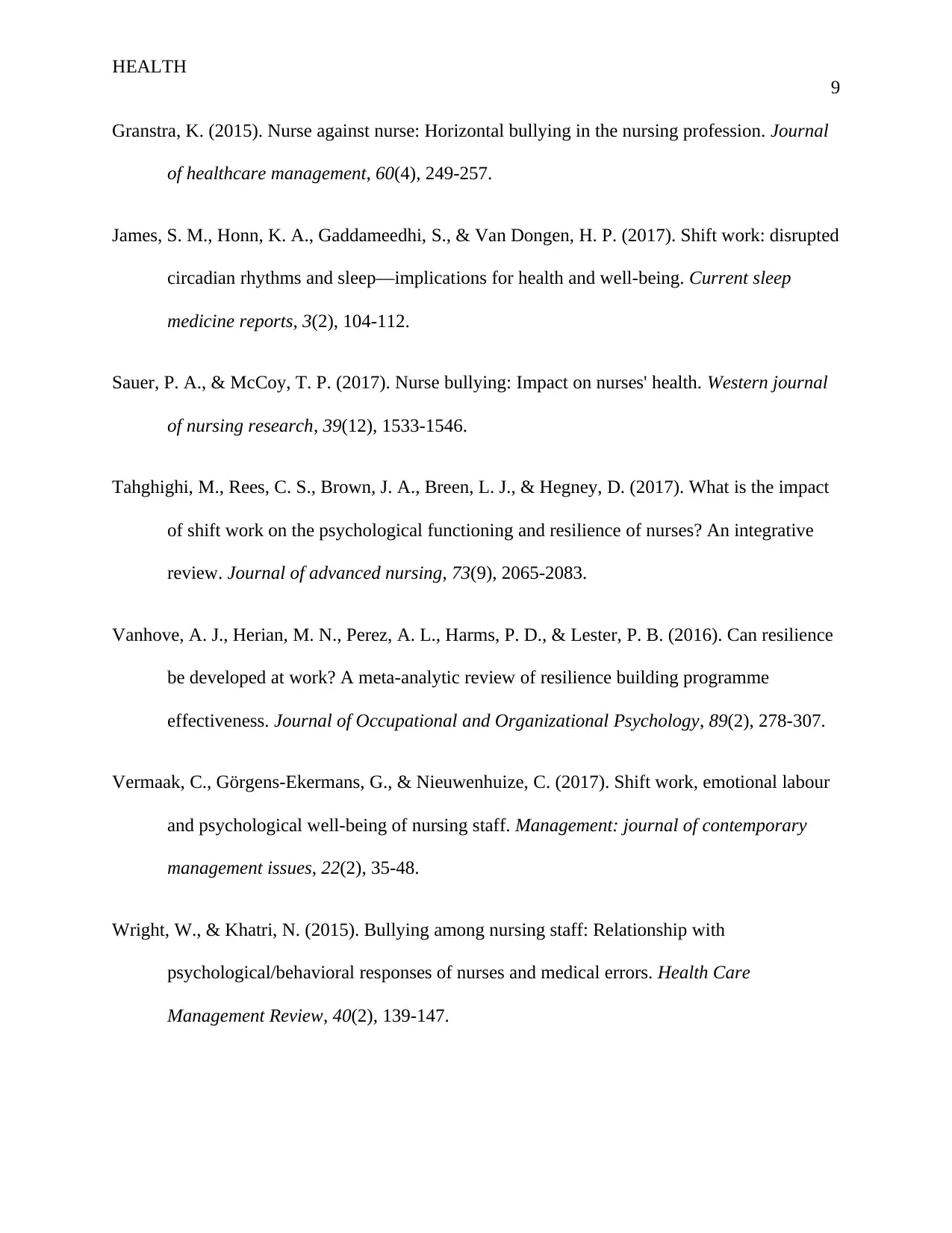
HEALTH
9
Granstra, K. (2015). Nurse against nurse: Horizontal bullying in the nursing profession. Journal
of healthcare management, 60(4), 249-257.
James, S. M., Honn, K. A., Gaddameedhi, S., & Van Dongen, H. P. (2017). Shift work: disrupted
circadian rhythms and sleep—implications for health and well-being. Current sleep
medicine reports, 3(2), 104-112.
Sauer, P. A., & McCoy, T. P. (2017). Nurse bullying: Impact on nurses' health. Western journal
of nursing research, 39(12), 1533-1546.
Tahghighi, M., Rees, C. S., Brown, J. A., Breen, L. J., & Hegney, D. (2017). What is the impact
of shift work on the psychological functioning and resilience of nurses? An integrative
review. Journal of advanced nursing, 73(9), 2065-2083.
Vanhove, A. J., Herian, M. N., Perez, A. L., Harms, P. D., & Lester, P. B. (2016). Can resilience
be developed at work? A meta-analytic review of resilience building programme
effectiveness. Journal of Occupational and Organizational Psychology, 89(2), 278-307.
Vermaak, C., Görgens-Ekermans, G., & Nieuwenhuize, C. (2017). Shift work, emotional labour
and psychological well-being of nursing staff. Management: journal of contemporary
management issues, 22(2), 35-48.
Wright, W., & Khatri, N. (2015). Bullying among nursing staff: Relationship with
psychological/behavioral responses of nurses and medical errors. Health Care
Management Review, 40(2), 139-147.
9
Granstra, K. (2015). Nurse against nurse: Horizontal bullying in the nursing profession. Journal
of healthcare management, 60(4), 249-257.
James, S. M., Honn, K. A., Gaddameedhi, S., & Van Dongen, H. P. (2017). Shift work: disrupted
circadian rhythms and sleep—implications for health and well-being. Current sleep
medicine reports, 3(2), 104-112.
Sauer, P. A., & McCoy, T. P. (2017). Nurse bullying: Impact on nurses' health. Western journal
of nursing research, 39(12), 1533-1546.
Tahghighi, M., Rees, C. S., Brown, J. A., Breen, L. J., & Hegney, D. (2017). What is the impact
of shift work on the psychological functioning and resilience of nurses? An integrative
review. Journal of advanced nursing, 73(9), 2065-2083.
Vanhove, A. J., Herian, M. N., Perez, A. L., Harms, P. D., & Lester, P. B. (2016). Can resilience
be developed at work? A meta-analytic review of resilience building programme
effectiveness. Journal of Occupational and Organizational Psychology, 89(2), 278-307.
Vermaak, C., Görgens-Ekermans, G., & Nieuwenhuize, C. (2017). Shift work, emotional labour
and psychological well-being of nursing staff. Management: journal of contemporary
management issues, 22(2), 35-48.
Wright, W., & Khatri, N. (2015). Bullying among nursing staff: Relationship with
psychological/behavioral responses of nurses and medical errors. Health Care
Management Review, 40(2), 139-147.
1 out of 10
Related Documents
Your All-in-One AI-Powered Toolkit for Academic Success.
+13062052269
info@desklib.com
Available 24*7 on WhatsApp / Email
![[object Object]](/_next/static/media/star-bottom.7253800d.svg)
Unlock your academic potential
Copyright © 2020–2026 A2Z Services. All Rights Reserved. Developed and managed by ZUCOL.





